Success Versus Happiness: What Is More Important?
 What is more important to you, happiness or success?
What is more important to you, happiness or success?
According to psychologist Daniel Gilbert, who is a psychology professor at Harvard, happiness is the ultimate goal of virtually all the decisions we make in life (Gilbert, 2010).
Gilbert suggests that the measure of a good decision depends on whether that decision brings us pleasure, a sense of wellbeing, happiness or contentment.
Researchers have focused a lot more on happiness in the past few years and science has finally started to pay attention to what it really means to be happy.
According to research done by Sonja Lyubomirsky (2008) in the book The Happiness Diet, some portion of our happiness may actually be within our power to control.
Lyubomirsky has been studying happiness for nearly two decades, and her research is leading the way in scientific study for interventions that can help increase human happiness.
[Reviewer’s update:
Since this post was originally published, there have been several critiques of Lyubomirsky’s (2008) pie chart breakdown of the source and set points of our happiness. While Sheldon and Lyubomirsky (2021) have acknowledged that the original breakdown estimates were off, the core idea remains true: We can affect our own happiness, to some degree.]
But which comes first: Happiness or success?
The real truth is that happiness is often subjective and difficult to measure. Success is often judged externally or by comparison to other people.
Happiness is usually an attribute of an individual whereas success can be attributed to an individual or to a group.
Happiness is a goal that many people aspire to. Most people also have a strong desire to be successful in life and they tend to believe that through this success they will automatically become happier.
While we may never know with 100% certainty which one is more important, we do know that success and happiness are inextricably linked.
Before you continue, we thought you might like to download our three Happiness & Subjective Wellbeing Exercises for free. These detailed, science-based exercises will help you or your clients identify sources of authentic happiness and strategies to boost wellbeing.
This Article Contains:
- The Relationship Between Happiness and Success
- The Difference Between the Two
- Which One Is More Important?
- Does Success Bring Happiness and Fulfillment?
- 9 Science-Backed Ways to Become Happier
- Building Happiness Worksheet
- 4 Simple Activities That Can Promote Happiness at Work
- Recommended Books
- 10 Quotes on Happiness and Success
- A Take-Home Message
- References
The Relationship Between Happiness and Success
According to Lyubomirsky, King, and Diener (2005) numerous studies have shown that happy people tend to be successful across multiple domains in life, including work performance, health, income, friendship, and even marriage.
The authors have devised a conceptual model that accounts for these findings. They argue that the happiness-success link exists not only because success makes people happy, but also from the positive affect engendering success.
The study examined three classes of evidence, including:
- Cross-sectional
- Longitudinal
- Experimental
The results of the findings revealed that happiness is associated with and precedes numerous successful outcomes. Moreover, it was also discovered that certain behaviors tended to parallel that success.
The evidence suggests that the idea of positive affect, the hallmark of wellbeing, may actually be the cause of many of the desirable characteristics, resources, and successes correlated with such happiness.
The real question then becomes, what comes first, happiness or success? This is akin to the chicken and egg scenario as well.
If happiness comes first, then you must surmise that you have to figure out how to be happy before your success will come rolling in.
On the other side of the coin is the idea of success coming first, before happiness.
What does it take to really be happy? Do you have to be successful in order to be happy? There are most likely millions of people in the world who would disagree with you on that point because success does not guarantee happiness.
There are just as many people out there who deem themselves happy, while not necessarily successful, as there are successful people still trying to figure out how to be happy.
How do these two constructs tie together? That is the issue we will discuss.
According to the fight or flight theory, humans were not wired for happiness, they were wired for survival.
Many of us find ourselves rushing through life, chasing happiness. The problem is that we never quite get there.
For many of us, happiness is something we aspire to. Happiness is somewhere we get to someday. What we fail to recognize is that happiness is a state of mind, not a destination.
We know happiness is not a static state, because even the happiest people feel blue sometimes.
Norrish and Vella-Brodrick (2008) studied whether happiness is even a worthwhile pursuit. Happiness, the pursuit of it, and what it means to live a good life has been long debated.
People are increasingly looking for new ways to become happier.
This is indicated by the growing demand for self-help books and literature.
Only recently have social scientists begun to really study happiness. According to Norrish and Vella-Brodrick (2008), psychology has traditionally been a healing profession that has been mainly focused on pathology, dysfunction and mental illness.
Some social scientists have even gone as far as suggesting that investigating human emotions is a luxurious or even indulgent goal in comparison to the importance and the need to understand human suffering.
Some scholars in the field go as far as saying that psychology’s more traditional negative perspective ignores the more positive aspects of human functioning.
Thankfully this is rapidly changing with the advent of the positive psychology movement.
The Difference Between the Two

Everyone defines it differently. Some people may find happiness in simple small things like a day in the park or a happy moment. Other people may find happiness more of an elusive quality.
Research in positive psychology defines a happy person as someone who experiences frequent positive emotions, such as interest, joy and pride, and infrequent negative emotions such as sadness or anxiety (Lyubomirsky et al., 2005).
Happiness is also related to life satisfaction, appreciation of life and moments of pleasure.
Overall, happiness has to do with the positive experience of emotions.
According to Norby (2013), positive psychology helps provide methods that help us rethink the way we work. Not only does it provide us with tools that help inoculate us against stress, but it also shows us how we can achieve a state of happiness that is a more effective way to work or accomplish a task.
Norby compares our mind and brain to actors on a stage. The actors on the stage in your brain affect what you are thinking about and how to get to a possibility.
Shawn Achor, the author of “Happiness Advantage” undertook an experiment where he delivered three hours of positive psychology training to a group of people.
After the experiment, Achor returned to gauge the success of the training. The testing showed that in a very short period of time, the group measured significantly higher life satisfaction scores and lower stress scores than those who did not receive the training.
Achor’s (2016) seven principles of happiness – each introduced as a chapter in his book – include the following.
Seven principles of happiness
- The happiness advantage: How happiness gives your brain and organization the competitive edge
- The fulcrum and the lever: Changing your performance by changing your mindset
- The Tetris effect: Training your brain to capitalize on possibility
- Falling up: Capitalizing on the downs to build upward momentum
- The “Zorro” circle: How limiting your focus to small, manageable goals can expand your sphere of power
- The 20-second rule: How to turn bad habits into good ones by minimizing barriers to change
- Social investment: Why social support is your single greatest asset, or not to retreat into yourself
[Reviewer’s update:
For additional information about what constitutes “happiness,” I would recommend Corey Keyes and Martin Seligman’s work on flourishing and the PERMA model (e.g., Keyes, 2002; Keyes & Haidt, 2003; Seligman, 2011; Seligman, 2018). For a nice summary, check out our article on Seligman’s PERMA+ model explained.]
What is success?
Defining success can also be challenging. The dictionary defines success as:
“The fact of getting or achieving wealth, respect, or fame.”
However, this definition falls short in many ways. Success is much more than mere financial success because you must also feel successful in other areas of life such as love and relationships, health, and more.
In the end, success is much more than just wealth and power.
- Barbara Bush defined success as how you treat others, from family to strangers.
- Albert Schweitzer defined success as loving what you do.
- Zappos CEO Tony Hsieh says success is all about living in accordance with your values.
- Author Maya Angelou believed success is about enjoying your work.
- Billionaire Richard Branson believes success is about engagement.
Thomas Edison recognized that success is a grind in his quote:
“Success is 1% Inspiration and 99% Perspiration.”
The best definition of success may just be author Stephen Covey’s definition when he stated that success is deeply individual.
“If you carefully consider what you want to be said of you in the funeral experience, you will find your definition of success.”
Thinking of how you would best define your life and your idea of success at your deathbed, may, in fact, be the best way to get crystal clear on your idea of success.
Which One Is More Important?
When it comes right down to it, success and monetary wealth don’t necessarily equate to happiness and security.
It doesn’t do you much good in terms of your level of happiness if you are successful monetarily, but miserable in your personal life.
On the other hand, you may be incredibly happy with your personal life or other relationships, but still struggling with success or struggling financially.
Both of these indicators are interconnected in a sense. Happiness affects your level of success and your level of success affects your happiness.
The happiness set point
Norrish and Vella-Brodrick (2008) talk about the happiness set point, also called the dynamic equilibrium theory.
This idea surmises that despite changes in your individual circumstances, your level of happiness remains remarkably constant over time.
This happiness set point is believed to be caused by our tendency as humans to rapidly adapt to changes in our environment.
This process of constant adaptation is commonly referred to as the hedonic treadmill or homeostatic control.
In support of this theory, researchers found that happiness levels of lottery winners, although initially high, soon returned to their normal range of happiness.
The same thing was found with paralysis victims, who were initially high on negative affect.
If each of us has a happiness set point that concept challenges the viability of undertaking research or doing interventions designed to increase individual happiness.
Despite the assertion that attempting to increase happiness is challenging, recent research has resulted in some important new developments regarding the happiness set point.
Diener (2006) provided a revision of the original hedonic treadmill theory. This information was based on an evaluation of data from the Victoria Quality of Life Panel Study and the 1990 World Value Survey.
Diener’s 5 revisions to the original hedonic treadmill theory:
- Happiness set points are thought to be above neutral, with most people being relatively happy a significant portion of the time.
- Happiness set points may differ from individual to individual.
- Life satisfaction, positive affect, and negative affect may each have their own unique set points. Each of these may also exhibit different rates of hedonic adaptation.
- Certain life events such as the death of a spouse or the onset of a disability can result in significant changes to one’s happiness levels.
- The rates to which someone adapts to changes in circumstances may differ from individual to individual. (Those with positive coping strategies may return to baseline levels of happiness more rapidly than those who do not.)
Looking at these revisions we can surmise that happiness may actually be quite amenable to intervention.
Does Success Bring Happiness and Fulfillment?
Richard St. John, a marketer and success analyst talks about the idea that success is not a one-way street but a constant journey.
In his TED Talk, St. John talks about his personal journey of success.
St. John talks about the concept of reaching success and the fact that the work does not stop once you reach this point.
In order to continue being successful, you have to constantly create new ideas and new passions. You have to remember why you started doing what you are doing in the first place.
If you reach the pinnacle of your success and stop – you will not be able to keep the success going.
Each of us is taught at a young age that achieving certain milestones of success in life is important.
We work to do well in school, work to get into college, work to have a prestigious career, and then work on living in the right house or marrying the right person.
This happiness and success quest continues throughout our lives.
There is a misconception that each of these things will make us happy. The truth may very well be that none of these things really have anything to do with our level of happiness.
What really happens is we reach our individual goals and feel happy for a while. Eventually, we discover we need to set new goals to achieve an even higher level of success to get the same buzz.
All of this begs the question: Does success bring happiness and fulfillment?
Our happiness may have its own set point. When we achieve success, we feel happy, but this happiness doesn’t often last. Once the condition is met, we start looking for that next goal to pursue.
What we might eventually discover is the idea that happiness is not only about setting goals and achieving them, but in finding that sense of happiness and joy within ourselves and in our daily life.
Knowing this, it’s also important to examine some things you can do to feel happy at the moment.
[Reviewer’s update:
It’s important to note that while accomplishment is indeed a necessary component of happiness, it’s just one piece of the puzzle, along with positive emotions, engagement, positive relationships, and meaning (Seligman, 2011).]
9 Science-Backed Ways to Become Happier
- Express gratitude.
- Practice something challenging.
- Connect with someone.
- Stop procrastinating.
- Be intellectually curious.
- Be open to new experiences.
- Express physical affection.
- Have compassion.
- Strengthen your relationships.
Expressing gratitude and feeling grateful can go a long way to happiness and joy. You can be thankful for many things such as your health, your children, your home, or even the fact that you have food to eat.
Thinking about the good things in life and stopping to smell the roses along the way can help you feel happier in the moment.
Keeping your brain active by practicing something challenging is another good tip.
Learning a new language, or playing an instrument or even learning yoga, can help you activate your natural endorphins or feel-good chemicals in the brain. Try doing something you can improve upon to challenge yourself.
Making powerful connections and connecting with other people is integral to your level of happiness and fulfillment in life.
It doesn’t matter if you connect over the phone, or in person, just the act of connecting can help you feel better.
Those who don’t continually put things off until tomorrow may also be happier. Getting things done helps you feel proactive and prideful. When you get things done, you feel a sense of accomplishment, which can help you feel happier.
Never stop learning or being curious! Reading a new book, watching a documentary or having meaningful conversations can help you feel better too.
Being open to new experiences can also help you boost your level of happiness. It doesn’t matter if you are trying a new food or trying out something like scuba diving. Trying new things can be fun and encouraging.
Expressing physical affection is also important. According to Virginia Satir, a respected American therapist, each of us needs four hugs a day just for survival! Eight hugs a day are suggested for maintenance and twelve hugs a day are suggested for growth.
Hugs create a sort of trickle-down effect and release of oxytocin, which can reduce stress and elevate your mood.
Developing compassion is also important. Those who are interested in other’s lives and other’s stories are usually happier than those solely concerned with themselves. Try doing little random acts of kindness for strangers or those you love, and notice how that makes you feel.
Strengthening your relationships is also important for your happiness. In one 80-year long study of 268 Harvard undergraduate males, researchers looked at every aspect of life from lifestyle to political views.
Scientists began tracking Harvard sophomores in 1938 during the great depression. They hoped that the longitudinal study would reveal clues to leading a happy and healthy life.
What they discovered was that relationships and how happy we are in these relationships have a very powerful influence on our health.
Close relationships mean even more than money or fame, and relationships are what keep people happy throughout their lives.
These important ties to other people help protect us from life’s discontent. They also protect us from mental and physical decline.
What this tells us is that relationships are integrally important for both our happiness and wellbeing.
Making it a habit to nurture your closest relationships and letting go of those that cause you pain or those that feel toxic can go a long way to helping you live a better life (Cherian, 2018).
Success and happiness | Motivated – The Official Steve Harvey
Building Happiness Worksheet
There are many ways to build happiness. The Building Happiness Worksheet includes a list of activities that have been found to help build a sustained level of happiness when practiced on a regular basis (Therapist Aid, 2012).
These may seem like simple things, but they can make a big difference when it comes to your level of happiness.
Getting a promotion, a new relationship or winning the lottery will only provide a temporary boost when it comes to happiness. Each of has a baseline or a set point we continually return to when it comes to happiness.
Maintaining a sustained level of happiness takes a little effort. Trying these exercises on a regular basis is a wonderful way to build lasting happiness and joy.
- Gratitude
- Acts of Kindness
- Exercise
- Meditation
- Positive journaling
- Fostering relationships
Gratitude is a wonderful practice to engage in. Try writing down three things for which you are grateful for every day. These can be simple mundane things or big things.
The point is to get something down on paper, every day. Writing down statements of gratitude, even on your worst days, can help you focus on the positive aspects of your life.
Acts of Kindness are another thing you can do. Making a conscious effort to do something nice for someone for no reason at all can help you feel good. You might be shocked at how a simple act of kindness can turn your whole day around.
Exercise has many positive effects as well. Being physically active can help you increase your energy, boost your immune system, and give you a sense of accomplishment. Exercise can also reduce insomnia, stimulate brain growth, and act as an anti-depressant. Try taking a walk or a bike ride the next time you feel you need a boost.
Meditation has been linked with reduced anxiety and more positive emotions. Those who meditate on a regular basis may even permanently restructure their brain to create a sustained level of happiness.
Taking the time to engage in positive journaling is another happiness booster. Writing about the happy events in your life, or writing about a good day with friends can help you get into the habit of focusing on the positive.
Strong social connections and fostering relationships can also help you feel happier. It turns out that strong social connections are thought to be a powerful influence on our mood.
Those who dedicate time to spend with family or friends tend to show the highest levels of happiness. If you can’t spend time with someone in person, pick up the phone or send an email. Nothing is more powerful than spending time with those you care about.
4 Simple Activities That Can Promote Happiness at Work
- Connect with your peers.
- Get into the habit of thanking people.
- Walking meetings.
- Get into the habit of putting yourself first.
Connecting with your peers and taking steps to get to know them better can go a long way toward building happiness.
Moss suggests using your coffee break time to socialize at least once a week. She also suggests finding opportunities to drop by someone’s desk you are not familiar with to say hello.
A quick connection might also lead to more opportunities for collaboration.
It’s also important to get into the habit of saying thanks. You can do this by sending out a quick email of thanks before you leave for the day or texting someone about a job well done. A little praise goes a long way.
Taking a walking meeting is also a great option. We often feel tied to our desks, so walking and talking is a great option to get the juices flowing.
The more we get up from our desk and stretch and move, the more productive we are.
Finally, Moss suggests getting into the habit of you. What this really means is learning to put yourself first. Taking 20 minutes to read something that provides nothing but joy, taking 5 additional minutes to have a cup of coffee or enjoying a 15-minute nap can help you feel better.
Starting with small bits of time can give your brain the rest it needs to be more productive for the rest of the day.
Emotional control and good leadership, according to Moss, comes with a well-rested and productive brain. Moss (2016).
Happiness can even help us navigate change more effectively, according to Moss.
Emma Seppala, Science Director of Stanford University’s Center for Compassion and Altruism Research and Education and author of the book “The Happiness Track” describes change like this:
“We can’t control our external circumstances, and things change constantly whether at work or in our personal lives. The only thing we can have a say over is our state of mind.”
Seppala also talks about the importance of building resilience and the ability to generate more inner peace, to stay calm in the face of chaos and to remain emotionally intelligent as we communicate with others.
We must cultivate this even in the midst of conflict or hurt feelings. All of this helps us make good decisions even when we’re feeling upset.
Seppala suggests building internal resilience by:
- Meditating.
- Doing breathing exercises.
- Engaging in an activity that helps train the nervous system to be calmer.
Doing so helps us calm that overwhelming feeling and navigate the ebbs and flows of life.
Recommended Books
From a great selection of books on happiness and success, the following are highly recommended:
Unlocking Happiness at Work – Jennifer Moss and Shawn Achor
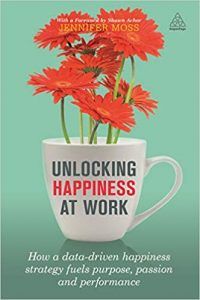
The book demonstrates how happiness can have a real impact on the bottom line. Unlocking happiness at work can:
- Fuel higher performance.
- Provide a greater sense of purpose.
- Spread passion throughout organizations.
Moss talks about how to be happier and make others happier through the power of habits, emotional intelligence and an innovative approach to work/life flow.
The book contains valuable case studies from companies like The Body Shop, Misfit Inc., Zappos, and Lululemon.
According to Moss, we are looking at happiness all wrong. In Moss’s opinion, happiness is a choice we must consciously make every day. Moss infers that society has fallen victim to false branding when it comes to happiness.
Moss suggests that happiness:
- Is intangible.
- Cannot be attained or achieved.
- Not something you chase.
- Happiness is sequential.
The more we pursue happiness, the harder it is to obtain. Happiness, in Moss’s opinion, comes after you work on building up traits like resilience, efficacy, optimism, hope, gratitude, and empathy.
So much of our time is consumed with work, that it behooves us to look at ways we can pursue happiness where we spend the bulk of our time.
Find the book on Amazon.
The Power of Habit – Charles Duhigg
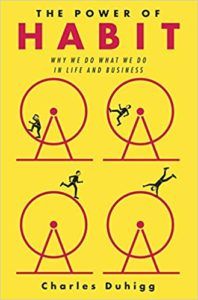
By building positive habits we can turn the emotional state and bundle the fast-firing neurons in our brain to make happiness a permanent trait.
Drawing from the science of neuroplasticity, habits are built by modifying and repeating behaviors until we can move our conscious actions into the subconscious mind.
The book encourages us to focus on building new habits, one at a time. Although this may take a little time, according to Moss, once happiness is achieved the positive impacts are felt almost immediately.
To experience the book yourself, you can purchase it from Amazon.
Books about success
Books about success include old classics as well as new ones:
- How to Win Friends and Influence People – Dale Carnegie
- The 7 Habits of Highly Effective People – Stephen Covey
- The Magic of Thinking BIG – David J. Schwartz, PH.D.
- Think and Grow Rich – Napoleon Hill
- When: The Scientific Secrets of Perfect Timing – Daniel H. Pink
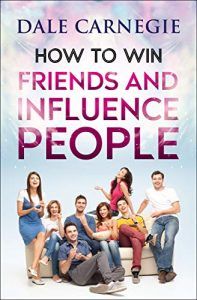
Carnegie shows us how to go after the job we want, and get it, how to take the job we have and improve it and how to take any situation and make it work better for us.
His words can help you achieve success in both your business and personal life. The book also includes:
- Six ways to make people like you.
- Twelve ways to win people to your way of thinking.
- Nine ways to change people without arousing resentment.
The book can help you achieve your maximum potential.
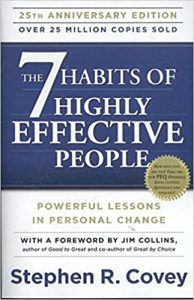
The 7 Habits book describes each habit step-by-step:
- Habit 1: Be Proactive.
- Habit 2: Begin With The End In Mind.
- Habit 3: Put First Things First.
- Habit 4: Think Win-Win.
- Habit 5: Seek First To Understand Then Be Understood.
- Habit 6: Synergize.
- Habit 7: Sharpen The Saw.
Dr. Covey’s 7 Habits book is both inspiring and impactful.
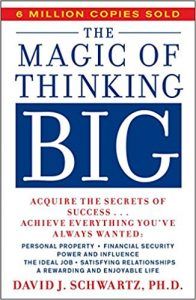
The book contains strategies that can help you:
- Believe in your own success.
- Cure yourself of the fear of failure.
- Think and dream creatively.
- Believe that you are what you think you are.
- Make your attitudes your allies.
- Learn how to think positively.
- Turn defeat into victory.
- Use goals to help you grow.
- Think like a leader.
In the end, magnifying your thinking strategy can be a great recipe for success.
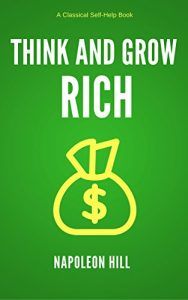
Hill’s study of these “best practices” was revolutionary for the time it was published in 1937.
In the book, Hill talks about a 13-step program that will set you on the path to wealth and success.
- Desire
- Faith
- Auto-suggestion
- Specialized knowledge
- Imagination
- Organized planning
- Decision
- Persistence
- Power of the mastermind
- The subconscious mind
- The brain
- The sixth sense
- How to outwit the six ghosts of fear
“All the breaks you need in life wait within your imagination. Imagination is the workshop of your mind, capable of turning mind energy into accomplishment and wealth.”
Napoleon Hill
Called the greatest motivational book of all time, the book outlines the path to success for hundreds of America’s most affluent people.
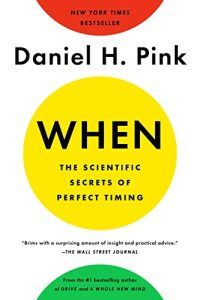
According to Pink, the time of day can have a big impact when it comes to the decision-making process.
Timing can also come into play in how well we learn and our ability to be effective and productive.
Pink’s research is drawn from psychology, biology, and economics. Pink offers helpful strategies in how we can best time our lives to succeed. The book also offers strategies for self-improvement and helps us understand how we can we use hidden patterns of our day to build the ideal schedule.
Books about happiness are also wide-ranging:
- The How of Happiness – Sonja Lyubomirsky
- Flourish – Martin Seligman
- Thinking Fast and Slow – Daniel Kahneman
- The Power of Habit – Charles Duhigg
- The Happiness Advantage – Shawn Achor
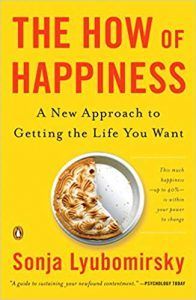
According to Lyubomirsky, happiness is the Holy Grail of science. In her research, she not only presents the scientific literature but also has a self-help component where she gives advice and recommendations on what to do based on research results.
Some of the research-based exercises in the book include things like practicing optimism when imagining the future, instructions in how best to savor life’s pleasures in the here and now and a thorough explanation of the importance of staying active to be happy.
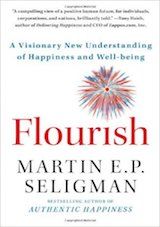
The book outlines the four components of wellbeing:
- Positive emotions.
- Engagement with what one is doing.
- A sense of accomplishment.
- Good relationships.
The book is filled with research and stories that help illustrate each component. It is a rich resource for living a life that makes you happier.
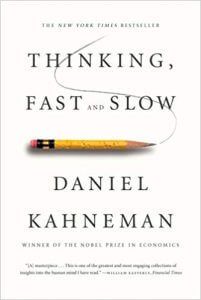
Kahneman describes system 1 as fast, intuitive and emotional and system 2 as slower, more deliberate and more logical.
The book talks about the overconfidence on corporate strategies, the difficulties of predicting what might make us happy in the future and the profound effect of cognitive bias.
The book also reveals how we can tap into the benefits of both parts of our mind to facilitate change.
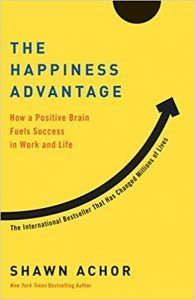
Published in 2010, the book helps you think differently in terms of what happiness and success are truly about.
According to the book, chasing after success, in the hopes that it will make you happy is not a plan that works for most people.
The book focuses on strategies that help create happiness in the moment while capitalizing on its many benefits when it comes to becoming more successful.
Many of us think that when we hit that next sales target or lose that five pounds that we will then be happy. We have learned to put success first and happiness second.
Achor believes that formula is broken. He promotes happiness first, success second. In Achor’s opinion, happiness leads to success much more than success leads to happiness.
According to the author, we become more successful when we are happier and more positive.
To recap, the book covers ten main points:
- Why we have the formula for success backward.
- How happiness promotes productivity.
- How happiness can improve our physical health.
- How we are primed for high performance.
- How happiness can undo the negative aftereffects of stress.
- How we can become happier and believe change is possible.
- Using meditation as a permanent happiness boost.
- The benefits of physical exercise.
- Turning away from the news.
- Realizing money can buy happiness if it’s spent on experiences versus things.
According to Achor, more than a decade of groundbreaking research in the field of positive psychology and neuroscience has proven that the relationship between happiness and success works the opposite of what we think, which is very refreshing thought.
10 Quotes on Happiness and Success
What we think determines what happens to us, so if we want to change our lives, we need to stretch our minds.
Wayne Dyer
Many of life’s failures are people who did not realize how close they were to success when they gave up.
Thomas A. Edison
Life is really simple, but we insist on making it complicated.
Confucius
Today is life–the only life you are sure of. Make the most of today. Get interested in something. Shake yourself awake. Develop a hobby. Let the winds of enthusiasm sweep through you. Live today with gusto.
Dale Carnegie
The secret of success is learning how to use pain and pleasure instead of having pain and pleasure use you. If you do that, you’re in control of your life. If you don’t, life controls you.
Tony Robbins
Happiness doesn’t depend on what we have, but it does depend on how we feel toward what we have. We can be happy with little and miserable with much.
William D. Hoard
If you want to live a happy life, tie it to a goal, not to people or objects.
Albert Einstein
Success is not the key to happiness. Happiness is the key to success. If you love what you are doing, you will be successful.
Albert Schweitzer
Until you are happy with who you are, you will never be happy with what you have.
Zig Ziglar
Your success and happiness lies in you. Resolve to keep happy, and your joy and you shall form an invincible host against difficulties.
Helen Keller
A Take-Home Message
Success is getting what you want; happiness is wanting what you get.
Ingrid Bergman
When it comes right down to it, both happiness and success are interconnected in a sense. Happiness affects your level of success and your level of success affects your happiness.
Happiness is really a choice you can choose to make.
Many of us are so wrapped up in trying to get ahead that we forget that we can choose to be happy in the moment.
You can steal time out of your day to simply take a walk and enjoy nature. You can hug a friend or sit with a cup of tea.
You can take stock of your life and realize that you are very lucky to be exactly who you are.
Things don’t always make us happy nor does money or possessions or that perfect job. Relationships don’t necessarily make us feel happy if we are not already feeling that happiness within.
When it comes to the relationship between happiness and success, we can surmise that success is something we pursue while happiness is something we acquire.
According to Boehm and Lyubomirsky (2008) past research has demonstrated a relationship between happiness and workplace success.
For example:
- Happy people earn more money when compared to their less happy peers.
- Happy people also tend to display superior performance and perform more helpful acts.
Past research has often assumed that an employee is happy and satisfied because he or she is successful.
In the author’s review of the evidence, an alternative hypothesis may actually be more accurate, that happiness is a source of why particular employees are more successful than others (Boehm & Lyubomirsky, 2008).
The authors conclude that the evidence suggests that happiness is not correlated with workplace success, but that happiness often precedes measures of success and that the induction of positive affect leads to improved work outcomes.
In the end, we can’t always control our external circumstances because life is ever-changing.
The only thing we can have a say over is our state of mind. Whether or not you believe that happiness attracts success or not, choosing happiness is something you can do every day.
We hope you enjoyed reading this article. Don’t forget to download our three Happiness Exercises for free.
- Achor, S. (2016). The happiness advantage. Retrieved from http://goodthinkinc.com/resources/books/the-happiness-advantage/
- Boehm, J. K., & Lyubomirsky, S. (2008). Does happiness promote career success? Journal of Career Assessment, 16(1), 101-116.
- Cherian, D. (2018, March 18). International Happiness Day: Science-backed ways to be happy. Gulf News. Retrieved from https://gulfnews.com/lifestyle/international-happiness-day-science-backed-ways-to-be-happy-1.2190116
- Diener, E. (2006). Guidelines for national indicators of subjective well-being and ill-being. Journal of Happiness Studies, 7(4), 397-404.
- Gilbert, D. (2010, May). Stumbling on happiness. American Psychological Association. Retrieved from https://www.apa.org/monitor/2010/05/happiness.aspx
- Keyes, C. L. M. (2002). The mental health continuum: From languishing to flourishing in life. Journal of Health and Social Research, 43(2), 207–222.
- Keyes, C. L. M., & Haidt, J. (Eds.). (2003). Flourishing: Positive psychology and the life well-lived. American Psychological Association.
- Lyubomirsky, S., King, L., & Diener, E. (2005). The benefits of frequent positive affect: Does happiness lead to success? Psychological Bulletin, 131(6), 803.-855.
- Lyubomirsky, S. (2008, April). The happiness diet. American Psychological Association. Retrieved from https://www.apa.org/monitor/2008/04/overthinking.aspx
- Moss, J. (2016). Unlocking happiness at work : How a data-driven happiness strategy fuels purpose, passion and performance. London, UK: Kogan Page.
- Norby M. (2013). Brain-based behavior: Our choices determine our happiness and success at work. Contract Management, 53(8).
- Norrish, J. M., & Vella-Brodrick, D. A. (2008). Is the study of happiness a worthy scientific pursuit? Social Indicators Research, 87(3), 393-407.
- Seligman, M. E. P. (2011). Flourish: A visionary new understanding of happiness and well-being. Free Press.
- Seligman, M. E. P. (2018). PERMA and the building blocks of well-being. The Journal of Positive Psychology, 13(4), 333–335.
- Sheldon, K. M., & Lyubomirsky, S. (2021). Revisiting the Sustainable Happiness Model and pie chart: can happiness be successfully pursued? The Journal of Positive Psychology, 16(2), 145–154.
- Therapist Aid. (2012). Building happiness (exercises). Retrieved from https://www.therapistaid.com/therapy-worksheet/building-happiness-exercises
Let us know your thoughts
Read other articles by their category
- Body & Brain (49)
- Coaching & Application (57)
- Compassion (26)
- Counseling (51)
- Emotional Intelligence (24)
- Gratitude (18)
- Grief & Bereavement (21)
- Happiness & SWB (40)
- Meaning & Values (26)
- Meditation (20)
- Mindfulness (45)
- Motivation & Goals (45)
- Optimism & Mindset (34)
- Positive CBT (28)
- Positive Communication (20)
- Positive Education (47)
- Positive Emotions (32)
- Positive Leadership (18)
- Positive Parenting (4)
- Positive Psychology (33)
- Positive Workplace (37)
- Productivity (16)
- Relationships (46)
- Resilience & Coping (36)
- Self Awareness (21)
- Self Esteem (38)
- Strengths & Virtues (31)
- Stress & Burnout Prevention (34)
- Theory & Books (46)
- Therapy Exercises (37)
- Types of Therapy (64)







What our readers think
Ok. The article was ok, I just feel as though it didn’t really answer as many questions as I would think, and some of the sentences were unfinished I didn’t really like it
“Success is not Happiness, Happiness is Success” Happiness is not a destination, it is the journey itself You can’t have Happiness, it is not something to possess You can’t go to Happiness, it is not a place You can’t be with Happiness, it is not a person You can’t buy Happiness, it is not a product You can’t achieve Happiness, it is not a transaction You can only be Happy, it is a state of being.
OMG!!!
I so much love this, its so educating
Wow, I love the article. I was actually looking for counter claim if people with more meamingful lives agreed that relationships are more important than achievments. And I have found this helpful…. Thank you. MAY HE GOOD LORD BLESS YOU.
It’s really helpful…thanks
It`s a Bible of success! Great!
Very useful & informative , explains happiness & success in many different ways. The references are treasure of knowledge , thank you for sharing.
Al grano. No da espacio mas que a la acción. Que personalidad o manera de escribir tan clara!
Se ve tan sencillo. Escribe y dices las cosas donde el tiempo de pensarlo es hacerlo o accionar.
no hay otro tiempo mas que hoy. Gracias infinitas.
Muy sabia.
Fantastic explanation n mind-blowing examples.
Extremely intresting, educative & comprehensive .